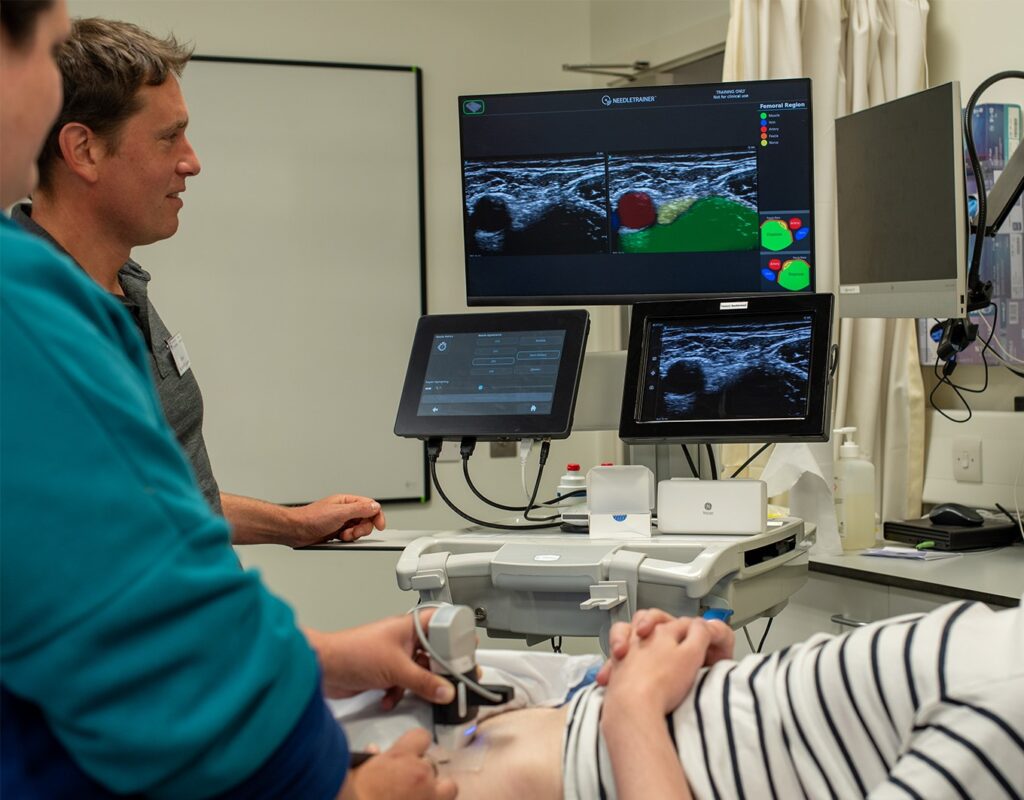“The course is absolutely top notch”: Regional anaesthesia short course a resounding success

From 22-23 June, the School of Medicine hosted the successful launch of a new “Regional Anaesthesia: Plan A Blocks” short course. “The course is absolutely top notch,” said a delegate and Member of the European Society of Regional Anaesthesia and Pain Therapy (ESRA) Council of Representatives.
Developed by Dr James Bowness (Consultant Anaesthetist, Aneurin Bevan University Health Board) and Dr Alasdair Taylor (Consultant Anaesthetist, NHS Tayside), this comprehensive cadaveric- and simulation-based programme caters to trainee and consultant anaesthetists, providing participants with a standardised, ESRA-endorsed approach to the seven Plan A blocks. An ambitious new standard of the Royal College of Anaesthetists is that all anaesthetists will be able to perform these procedures. For patients this will mean ubiquitous access to superb analgesia; for hospitals it will mean making better use of limited resource.
Each half-day session began with a tutorial conducted by School anatomists in the state-of-the-art Dissection Room. This provided a crucial foundation for the later practical sessions by identifying the anatomical structures relevant to each nerve block.
The subsequent practical sessions consisted of both cadaveric and live scanning/simulated needling components, including the use of NeedleTrainer, a cutting-edge simulation and artificial intelligence tool for scanning and needling produced by Intelligent Ultrasound (Cardiff, UK). This allowed delegates to gauge their progress and identify areas for improvement using real-time input from both their expert tutors and the NeedleTrainer metrics.
To ensure an equitable learning experience for all, anatomy tutorials were delivered to six participants in each group and practical sessions were conducted in groups of three. This allowed for more interaction between tutors and delegates, as well as more personalised feedback. “I now feel so much more confident and independent performing the Plan A blocks,” said a delegate and registrar anaesthetist who especially appreciated the small group sizes.
Lectures on a range of clinical topics formed the final component of each half-day session. Speakers offered valuable insights on indications and contraindications for regional anaesthetic techniques, the benefits and risks associated with regional anaesthesia, consent and documentation procedures, pharmacology and safe dosing, and how to avoid and manage complications. Combining practical experience with theoretical discussions was key to helping delegates consolidate their knowledge.
Alongside the learning outcomes, delegates also appreciated the opportunity to network with colleagues from across the UK. Participants spent their breaks exchanging ideas and experiences with fellow anaesthetists and hearing about new technology from sponsors Intelligent Ultrasound, GE Healthcare, and Vygon. School staff and visiting tutors also enjoyed working with such an engaged and enthusiastic cohort on what one tutor described as “a very well run and fun course.”
Stuart Gall, CEO of Intelligent Ultrasound, said: “Intelligent Ultrasound is all about making clinical ultrasound easier to learn and simpler to use.
The first of its kind, NeedleTrainer uses a retractable needle and virtual image overlays to simulate needling on a live participant, using a live ultrasound scan. This enables trainees to develop hand-eye coordination, optimum positioning, and accuracy in ultrasound-guided interventional procedures in a realistic clinical environment with minimal risk. We’re delighted to see NeedleTrainer being utilised to full effect on this innovative and impactful course.”
The School is delighted to have supported such a successful course, equipping delegates with the necessary skills and knowledge to perform Plan A anaesthesia blocks confidently and safely. Given the huge demand, successful implementation and positive feedback, plans are well underway to expand the course.
Registration is now open for the next iteration of this course, running from 11-12 April 2024!